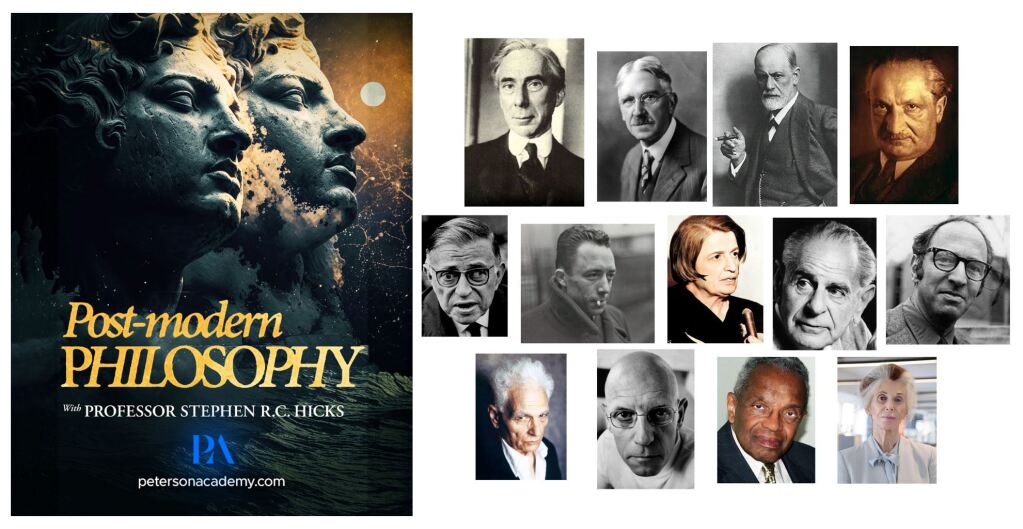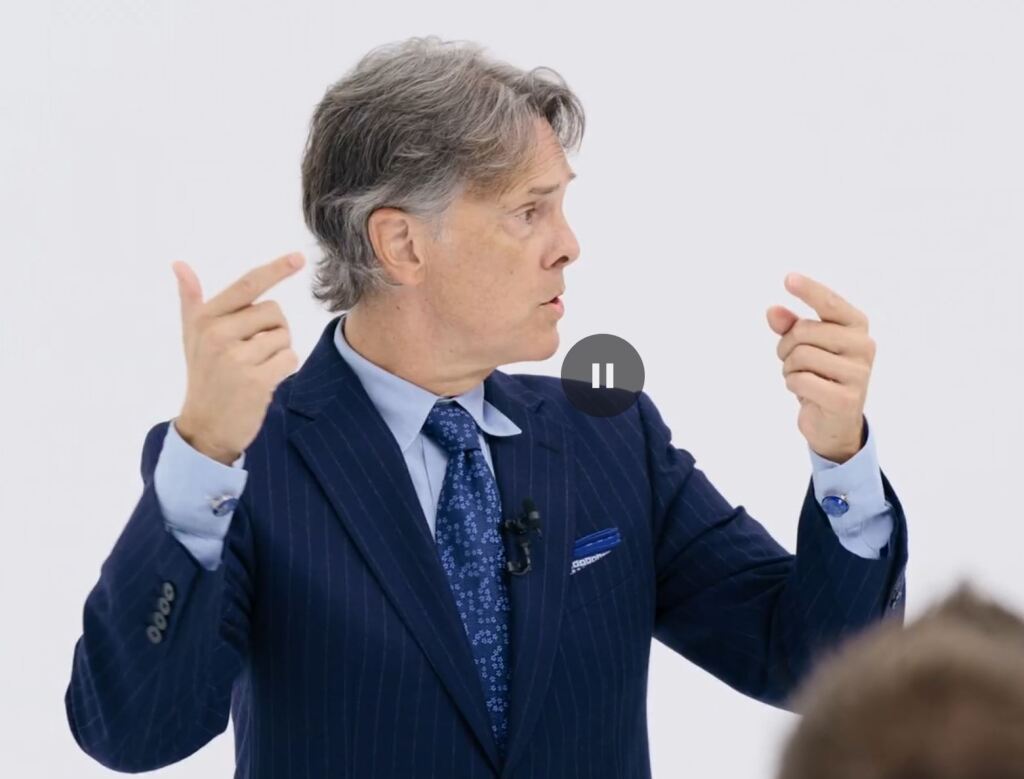In this eight lecture (nine-hour) course, Professor Hicks takes us on an exploration of the evolution of 20th-century philosophy, from the disappointed skepticism of Russell and the pragmatism of Dewey to the postmodern ideas of Foucault and Derrida.

We examine how philosophers responded to major events and challenges of the era, such as World War I, World War II, and the Holocaust, and how their ideas shaped political ideologies and global conflicts.
The course also delves into the emergence of critical feminist and race theories, as well as the development of objective approaches to ethics and the debate surrounding the objectivity of science. Ultimately, we establish the profound influence of philosophy on history, demonstrating how philosophical ideas have the power to transform society and shape the course of human progress.
Postmodern Philosophy is available at Peterson Academy.
Lecture One: Uncertain Prospects. Bertrand Russell and John Dewey

Themes: Disquieting inheritance: Entropy, Karl Marx, Charles Darwin. A century of war? Skepticism about knowledge. Enlarge your mind? Experiment? Titanic. Pablo Picasso. Vladimir Lenin. Thomas Edison. Texts: Russell: “The Value of Philosophy.” Dewey: The Impact of Darwin upon Philosophy.
Lecture Two: The Analysts of the Self. Sigmund Freud and Martin Heidegger

Themes: The new psychology. Pessimism. Instinct and aggression. Logic as limiting. Emotions as accessing. Nihilism? World War I. Charles Darwin. Oswald Spengler. Hannah Arendt. Texts: Freud: Civilization and Its Discontents. Heidegger: “What Is Metaphysics?”
Lecture Three: Absurdity and Meaninglessness? Jean-Paul Sartre and Albert Camus

Themes: The death of God? The reality of war. Depression and the Depression. The pointlessness of existence? Existence precedes essence. The meaning of life? Søren Kierkegaard. Friedrich Nietzsche. Martin Heidegger. Texts: Sartre: “Existentialism Is a Humanism.” Camus: “The Myth of Sisyphus.”
Lecture Four: What the Women Ethicists Are Up To. Ayn Rand and Philippa Foot

Themes: Naturalism. Bio-centrism. Value and virtue. Intrinsic/Objective/Subjective. Facts and Values. Ought from Is. Reason. Trolley Problems. Aristotle. Bertrand Russell, Rudolf Carnap, Max Horkheimer, Brian Medlin, Ernest Moody. Elizabeth Anscombe, Mary Midgely, Iris Murdoch, Simone de Beauvoir, Hannah Arendt, Simone Weil. Texts: Rand: “The Objectivist Ethics.” Foot: Natural Goodness.
Lecture Five: On the Objectivity of Science. Karl Popper and Thomas Kuhn

Themes: Logical Positivism and Analytic philosophy’s aspirations and travails. Scientific method. Science and pseudo-science. Falsifiability. Paradigms. Indoctrination. Progress? Truth? Immanuel Kant. Moritz Schlick. A.J. Ayer. Paul Feyerabend. Texts: Popper: Conjectures and Refutations. Kuhn: The Structure of Scientific Revolutions.
Lecture Six: Deconstruction and Power. Michel Foucault and Jacques Derrida

Themes: Power as substrate. Structuralism and Post-structuralism. Dekonstruction. Postmodernism. Alexis de Tocqueville. Karl Marx. Friedrich Nietzsche. Martin Heidegger. Texts: Foucault: History of Sexuality. Derrida: “Cogito and the History of Madness”.
Lecture Seven: Critical Feminist and Race Theory. Derrick Bell and Catharine MacKinnon

Themes: Feminism’s three waves. Olympe De Gouges, Mary Wollstonecraft, Simone de Beauvoir. Critical Theory and Frankfurt School: Horkheimer and Adorno. Marcuse. Anti-racism’s three waves. The Enlightenment, Frederick Douglass, Martin Luther King, Jr. Richard Delgado, Kimberlé Crenshaw. Texts: MacKinnon: Only Words. Bell: “Racial Realism.”
Lecture Eight: Premodern, Modern, and Postmodern

Themes: Philosophy as three-way debates. Enlightenment and Counter-Enlightenment. Chart: Pre-modernism, Modernism, Post-modernism. What next?
About the Instructor
Stephen R. C. Hicks, Ph.D., has been Professor of Philosophy at Rockford University, Illinois; Visiting Professor of Business Ethics at Georgetown University, Washington, D.C.; Visiting Professor at the University of Kasimir the Great, Poland; Visiting Fellow at Harris Manchester College of Oxford University; and Visiting Professor at the Jagiellonian University, Poland.
In 2010, he won his university’s Excellence in Teaching Award.
Dr. Hicks is author of Explaining Postmodernism: Skepticism and Socialism from Rousseau to Foucault, Nietzsche and the Nazis, Entrepreneurial Living, Liberalism Pro and Con, and Eight Philosophies of Education. He has published in Business Ethics Quarterly, Review of Metaphysics, and The Wall Street Journal. His writings have been translated into twenty languages.


Course trailer and enrollment options at the Peterson Academy site. Professor Hicks’s other courses — Modern Philosophy, Philosophy of Politics: From the French Revolution to World War II, Philosophy of Politics: From the Cold War to After 9/11, and Modern Ethics — are coming soon to Peterson Academy.